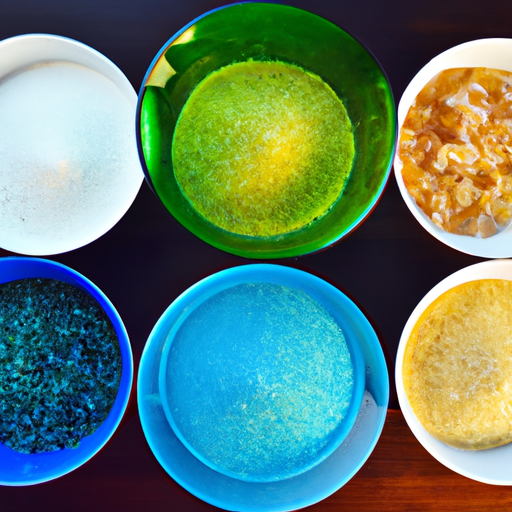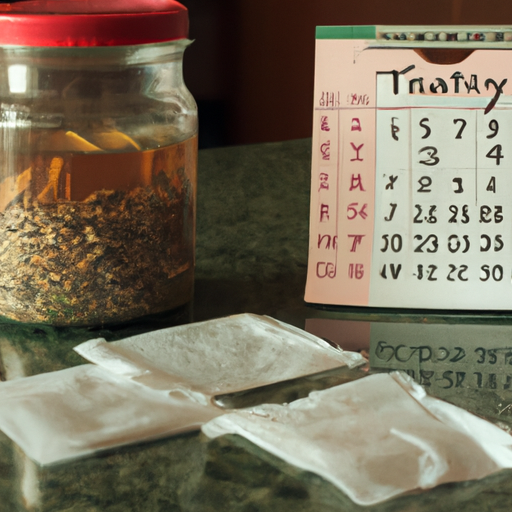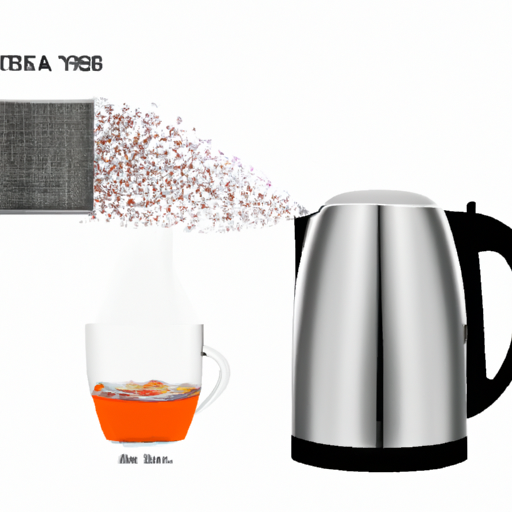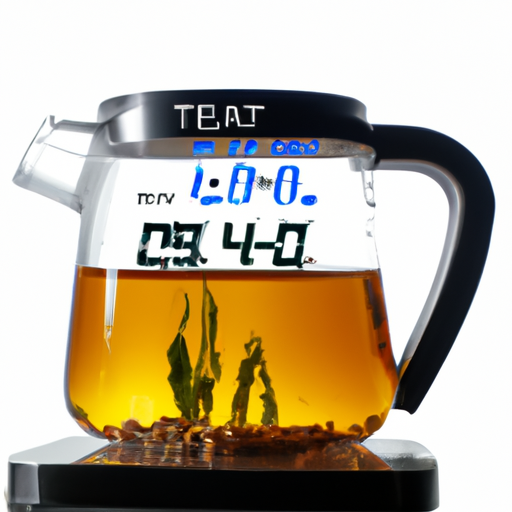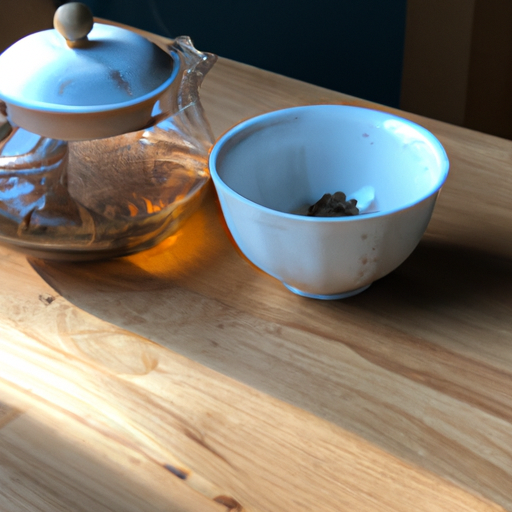As someone who cherishes tea, I continually seek out novel and intriguing mixtures to try. Lately, I’ve taken a liking to barley tea, which is a widely enjoyed drink in Asian nations. This tea, devoid of caffeine, is crafted from toasted barley grains. It offers a distinctive nutty taste with a hint of bitterness, making it an ideal choice for the sweltering days of summer.
However, I always struggle with deciding what type of sweetener to add to my barley tea. That’s why I decided to do some research and find out what type of sugar is best suited for this tea.
After some extensive research, I discovered that there are several types of sugar that can be used as a sweetener for barley tea. Each type of sugar has its unique flavor profile and health benefits. As a tea enthusiast, I’m always looking for ways to enhance the flavor of my tea while also being mindful of my health.
In this article, I will explore the different types of sugar that are good with barley tea, their health benefits, and the considerations you should make when choosing a sweetener for your tea. So, let’s dive in and discover the perfect sweetener for your barley tea.
Key Takeaways
- Different types of sugar can be used as sweeteners for barley tea, including honey, maple syrup, white sugar, brown sugar, coconut sugar, and muscovado sugar.
- Natural sweeteners like honey and maple syrup have additional health benefits and a more complex flavor profile compared to refined sugars.
- Artificial sweeteners provide a calorie-free option but have safety concerns.
- Choosing a sweetener for barley tea ultimately depends on personal preference based on taste, health concerns, and budget.
Overview of Barley Tea
Barley tea is a popular beverage in East Asian countries, with a nutty and toasty flavor profile that can be enjoyed hot or cold. To make the tea, barley grains are roasted and then steeped in hot water. The history of barley tea dates back to ancient China and Korea where it was primarily consumed for its medicinal properties. Over time, barley tea became a staple drink in these regions and eventually spread to Japan, Taiwan, and other parts of Asia.
Barley tea has cultural significance in East Asian countries. In Korea, it is believed that drinking barley tea can help improve digestion and relieve stress. It is also a popular drink during the summer months to help cool down the body. In Japan, barley tea is often served in restaurants as a complimentary drink and is also a common drink to serve to guests in the home.
When it comes to adding sugar to barley tea, there are a few different options to choose from. Some people prefer to sweeten their tea with honey, while others prefer to use white sugar. Brown sugar is also a popular option as it adds a subtle caramel flavor to the tea. Ultimately, the type of sugar used is a matter of personal preference, and it is recommended to experiment with different types to find the perfect balance of sweetness for your taste buds.
Types of Sugar
You might be surprised to know that the average American consumes about 152 pounds of sweeteners per year. With so many types of sweeteners available, it can be difficult to choose the right one for your needs.
When it comes to barley tea, there are a few types of sweeteners that work particularly well. Firstly, let’s talk about honey. Honey is a natural sweetener that is a great choice for those who want to avoid refined sugars. It has a distinct flavor that complements the nutty taste of barley tea. However, it’s important to note that honey is still a form of sugar and should be consumed in moderation.
Another option is maple syrup. Like honey, maple syrup is a natural sweetener that can add a rich, caramel-like flavor to your barley tea. It is also a good source of antioxidants and minerals like zinc and manganese. However, it’s important to choose pure maple syrup rather than the heavily processed varieties that are often sold in grocery stores.
When it comes to choosing the right sweetener for your barley tea, there are many options available. Whether you prefer the natural sweetness of honey or the rich flavor of maple syrup, there’s a sweetener that will work for you.
In the next section, we’ll take a closer look at white sugar and how it can be used in barley tea.
White Sugar
When it comes to adding sweetness to my barley tea, I usually reach for white sugar. It has a clean, neutral taste that doesn’t overpower the delicate flavor of the tea.
The texture of white sugar also dissolves easily, leaving no gritty residue behind. However, it’s worth mentioning that white sugar is processed and lacks any nutritional value, so moderation is key.
Taste and Texture
For a smooth and sweet taste, I highly recommend trying honey or brown sugar as sugar alternatives to white sugar in your barley tea. While white sugar is commonly used, these alternatives offer a unique taste that can enhance your tea-drinking experience. Additionally, they provide a different texture that can add to the overall enjoyment of the beverage.
When it comes to taste preferences, it ultimately depends on the individual. Some may prefer the classic taste of white sugar, while others may enjoy the richer flavor of honey or the caramel notes of brown sugar. However, it’s worth exploring different sugar alternatives to find what works best for you.
While there are pros and cons to each option, experimenting with different types of sugar can lead to a more personalized and enjoyable barley tea experience.
Pros and Cons
Exploring the different sweeteners available can add a whole new dimension to your experience with barley tea. When it comes to choosing a sweetener, there are pros and cons to consider.
Refined sugars, such as white sugar, dissolve easily and provide a consistent level of sweetness. However, they’re highly processed and stripped of any nutrients.
On the other hand, unrefined sugars, such as raw sugar or honey, retain some of their natural nutrients and provide a more complex flavor profile. They may not dissolve as easily and can be more expensive, but they’re a healthier option.
In addition to refined and unrefined sugars, there are also artificial and natural sweeteners to consider. Artificial sweeteners, such as aspartame and sucralose, provide a calorie-free option for those watching their weight. However, there are concerns about their safety and potential side effects.
Natural sweeteners, such as stevia and maple syrup, are derived from plants and are generally considered safe. They may have a distinct flavor profile that may or may not complement the barley tea. Ultimately, the choice of sweetener is a personal preference that depends on taste, health concerns, and budget.
When it comes to barley tea, brown sugar is a popular choice for those who prefer a natural sweetener with a rich flavor profile. Brown sugar is simply white sugar mixed with molasses, which gives it a caramel-like flavor. It’s less processed than white sugar and retains some of its natural minerals. Brown sugar dissolves easily and provides a consistent level of sweetness, making it a convenient option for those who want to sweeten their barley tea.
Brown Sugar
Brown sugar, with its rich molasses flavor, pairs perfectly with the nutty taste of barley tea – but have you ever tried it with a sprinkle of cinnamon? Brown sugar is a popular choice for sweetening barley tea due to its distinctive taste and aroma. It also contains a higher amount of molasses compared to other sugar types, which gives it a unique depth of flavor.
If you’re looking for brown sugar alternatives, you can try using coconut sugar or muscovado sugar, which are both unrefined sugars with a similar taste profile.
When it comes to recipes with brown sugar, there are plenty of options for incorporating it into your barley tea. You can simply add a teaspoon or two of brown sugar to your tea for a sweet and comforting drink. Or, you can get creative and make a brown sugar syrup by heating brown sugar and water in a saucepan until the sugar dissolves. This syrup can be stored in the refrigerator and used as a sweetener for your barley tea or other beverages.
While brown sugar is a delicious option for sweetening your barley tea, you may also want to consider natural sweeteners like honey or maple syrup. These sweeteners have a lower glycemic index than sugar, which means they won’t cause a spike in your blood sugar levels. They also contain antioxidants and other beneficial nutrients.
In the next section, we’ll explore some of the best natural sweeteners to use with barley tea.
Natural Sweeteners
Indulge in the natural sweetness of honey or maple syrup to add a touch of wholesome goodness to your favorite beverage. When it comes to natural sweeteners, honey is a popular choice for many. Not only does it add a delicious flavor to your tea, it also contains antioxidants and has antibacterial properties. However, it’s important to note that honey is still a form of sugar and should be consumed in moderation.
Another alternative to sugar consumption is stevia. Stevia is a natural sweetener that comes from the leaves of the stevia plant. It’s known for its zero calorie content and has been used as a sugar substitute for centuries. Stevia is a great option for those looking to reduce their sugar intake, but it’s important to find a high-quality stevia brand that doesn’t contain any additives or fillers.
Overall, there are many alternatives to sugar consumption that can still provide a sweet taste to your barley tea. Honey and stevia are just a few examples, but there are also other natural sweeteners like agave nectar and monk fruit extract. Incorporating these natural sweeteners into your daily diet can help reduce your sugar intake and improve your overall health.
In the next section, we’ll explore the health benefits of these natural sweeteners in more detail.
Health Benefits of Natural Sweeteners
As we’ve learned in the previous subtopic, natural sweeteners can be a great alternative to refined sugar. But did you know that these sweeteners also offer various health benefits? Let’s dive deeper into the health implications of using different types of sweeteners with your barley tea.
One of the most well-known natural sweeteners is honey. Honey contains antioxidants that can protect against cell damage and lower the risk of heart disease. It also has antimicrobial properties that can help fight off infections.
Maple syrup, another popular sweetener, is high in antioxidants and minerals such as calcium and potassium. These minerals are essential for maintaining healthy bones and muscles.
Stevia, a plant-based sweetener, has gained popularity in recent years due to its zero-calorie content. Studies have shown that stevia can help regulate blood sugar levels and lower blood pressure.
Another plant-based sweetener, monk fruit extract, is also known for its zero-calorie content and has been shown to have anti-inflammatory properties.
These sweetener alternatives offer a wide range of health benefits, making them a great choice for those looking to sweeten their barley tea without compromising their health.
When choosing a sweetener for your barley tea, it’s important to consider not only the taste but also the health implications. Sweetener alternatives such as honey, maple syrup, stevia, and monk fruit extract offer a variety of health benefits, from regulating blood sugar levels to fighting off infections.
By choosing a natural sweetener, you can satisfy your sweet tooth while also supporting your overall health and well-being.
Considerations when Choosing a Sweetener
When choosing a sweetener for your cuppa, you should consider factors such as taste preference, health benefits, and calorie content. There are many alternatives to sugar, such as honey, agave nectar, and stevia, that can be used to sweeten your barley tea. However, it’s important to understand the impact of sweeteners on health before making a decision.
Some sweeteners may have negative health effects, such as increasing the risk of diabetes and obesity. Artificial sweeteners, such as aspartame and sucralose, are often marketed as a healthier alternative to sugar, but research suggests that they may actually be harmful to the body. On the other hand, natural sweeteners like honey and stevia have some health benefits, such as antioxidant and anti-inflammatory properties.
It’s important to consider the calorie content of sweeteners as well. While some, like honey and agave nectar, may have more calories than sugar, they are often sweeter, so less is needed to achieve the desired taste. Overall, when choosing a sweetener for your barley tea, it’s important to weigh the taste, health benefits, and calorie content to make the best decision for your individual needs.
As you consider the impact of sweeteners on health and the calorie content of different options, keep in mind that the type of sweetener you choose may also impact the flavor of your barley tea. In the next section, we will explore which type of sugar pairs best with barley tea for a delicious and satisfying beverage.
Pairing Sugar with Barley Tea
To bring out the best flavor in your cup of barley tea, you’ll want to consider the specific sweetener that pairs well with it. Barley tea has a nutty, roasted flavor that can be enhanced by the right type of sweetness.
When it comes to choosing a sweetener, you’ll want to consider two things: sweetness levels and cultural preferences.
First, let’s talk about sweetness levels. Barley tea has a subtle flavor, so you don’t want to overpower it with too much sweetness. That’s why it’s important to choose a sweetener that has a mild sweetness level. Honey, for example, has a low to medium sweetness level and pairs well with barley tea. White sugar, on the other hand, has a high sweetness level, which can overpower the tea’s delicate flavor.
Secondly, cultural preferences should also be taken into account when choosing a sweetener for barley tea. In Japan, for example, it’s common to sweeten barley tea with brown sugar, which has a slightly molasses-like flavor. In Korea, people often add corn syrup or honey to their barley tea. In Chinese cuisine, rock sugar is a popular choice for sweetening barley tea.
When it comes to pairing sugar with barley tea, it’s important to choose a sweetener that has a mild sweetness level and takes into account cultural preferences. After sweetening your barley tea, you can also experiment with other additions, such as lemon or mint, to enhance the flavor even more.
Other Additions to Barley Tea
When it comes to enjoying a cup of barley tea, there are more options than just adding sugar. Personally, I’ve found that adding a splash of milk can give the tea a creamy and comforting taste.
Another option is to add a slice of lemon for a bit of tanginess, or some fresh mint leaves for a refreshing twist. These additions can enhance the flavor and provide a unique experience for your taste buds.
Milk
If you’re in the mood for a creamy twist on your barley tea, adding a splash of milk can give it a delicious sweetness without overpowering the nutty flavor. While any type of milk can be used, I find that whole milk complements the barley tea best.
Here are a few ways to incorporate milk into your barley tea:
- Cold milk: Pouring cold milk into your barley tea can give it a refreshing taste, perfect for hot summer days.
- Frothed milk: For a more luxurious drink, frothed milk can be added to your barley tea. This is especially great for those who enjoy lattes and cappuccinos.
- Milk alternatives: If you’re lactose intolerant or prefer a non-dairy option, there are many milk alternatives to choose from such as almond milk, coconut milk, or soy milk.
Moving on to the next addition to barley tea, lemon can be a great way to add a tangy twist to your drink.
Lemon
Adding a squeeze of fresh lemon to your cup of barley tea can give it a zesty kick that you’ll love. Lemon zest contains essential oils that can enhance the flavor of the tea and give it a refreshing aroma. The acidity of the lemon can also help to brighten the flavor profile of the tea and balance out any bitterness that may arise from the barley.
If you’re looking for a sweeter option, consider trying a honey lemon combination. Honey can add a subtle sweetness to the tea, while the lemon provides a tangy flavor. This combination not only tastes great but also has added health benefits. Honey has antibacterial properties while lemon is packed with Vitamin C, which can help boost your immune system.
Moving on to the next topic, mint can also be a great addition to your cup of barley tea.
Mint
Firstly, let’s talk about how mint can give your cup of barley brew an extra kick. Mint is a popular herb known for its refreshing taste and cooling properties. When added to barley tea, it can enhance the overall drinking experience and provide a variety of benefits.
Here are three ways to use mint in your barley tea:
- Infuse fresh mint leaves in hot water and add them to your brewed barley tea for a refreshing twist.
- Mix dried mint leaves with barley tea leaves before brewing for a minty flavor.
- Add a few drops of mint essential oil to your barley tea for a quick and easy way to enjoy the benefits of mint.
Besides its refreshing taste, mint has numerous benefits. It has been found to aid digestion, alleviate headaches, and improve respiratory health. Drinking mint-infused barley tea can also help soothe sore throats and ease nausea. So why not give your cup of barley tea an extra boost with some mint?
Frequently Asked Questions
What are the different types of barley tea available and how do they differ in taste?
When it comes to barley tea varieties, there are a few options to choose from. The most common types include roasted barley tea, barley tea with corn, and barley tea with brown rice. Each variety has its own unique flavor notes.
Roasted barley tea has a toasty, nutty flavor, while barley tea with corn has a slightly sweet taste. Barley tea with brown rice has a nutty and earthy flavor profile. It’s important to note that the taste of barley tea can also be influenced by the brewing method and water temperature. For example, brewing at a higher temperature can result in a stronger, more bitter flavor.
Overall, choosing a barley tea variety comes down to personal preference and experimenting with different flavors to find the one that suits your taste buds best.
Can artificial sweeteners be used as a substitute for natural sweeteners in barley tea?
As the saying goes, "you are what you eat,"and with that in mind, I’ve been exploring the possibility of using artificial sweeteners in my barley tea.
While these sweeteners may seem like a healthy alternative to natural sugar, there are some health concerns surrounding their use. Research has shown that artificial sweeteners can lead to weight gain, increased risk of diabetes, and other negative health effects.
While it may be tempting to use these sweeteners to cut calories, it’s important to consider the long-term impact on our health. In the end, it may be best to stick with natural sweeteners like honey or maple syrup when enjoying a refreshing cup of barley tea.
How does the brewing time affect the taste of barley tea, and do certain sweeteners pair better with longer or shorter brewing times?
When it comes to brewing barley tea, the length of time you steep the tea can have an impact on its flavor. Generally, a shorter brewing time will result in a lighter, more refreshing taste, while a longer brewing time will produce a stronger, more robust flavor.
As for sweetener preferences, it really comes down to personal taste. Some people prefer to use natural sweeteners like honey or agave, while others opt for artificial sweeteners like stevia or Splenda. Ultimately, the sweetener you choose should complement the flavor of the barley tea and enhance your overall enjoyment of the beverage.
Are there any potential side effects or risks associated with consuming natural sweeteners in barley tea?
When it comes to the potential health implications of consuming natural sweeteners in barley tea, it’s important to consider the impact on blood sugar levels. While natural sweeteners like honey or stevia may be a healthier alternative to refined sugar, they can still cause spikes in blood sugar if consumed in excess.
It’s recommended to limit the amount of added sweeteners in your diet, including in beverages like barley tea. The recommended daily intake of added sugars is no more than 10% of your daily caloric intake.
Consuming too much sugar, even natural sweeteners, can lead to potential risks such as weight gain, tooth decay, and an increased risk of developing chronic diseases such as diabetes and heart disease.
As with any dietary decision, it’s important to consider moderation and balance for overall health and wellness.
How does the temperature of the water used to brew barley tea affect the sweetness and overall flavor profile of the beverage?
When it comes to brewing barley tea, the water temperature can make a big difference in the final flavor profile.
Brewing techniques can vary depending on personal preference, but generally, using water that is too hot can result in a bitter, unpleasant taste.
On the other hand, using water that is too cold can lead to a weaker, less flavorful brew.
I remember one time when I accidentally used boiling water to brew my barley tea and the result was nearly undrinkable.
Since then, I’ve made it a point to use water that is around 185°F (85°C) to get the perfect balance of sweetness and flavor.
Overall, paying attention to water temperature is an important aspect of brewing delicious barley tea.
Conclusion
After researching and experimenting with different types of sugar, I’ve found that natural sweeteners pair best with barley tea. Not only do they provide a unique flavor profile, but they also offer numerous health benefits.
Whether you choose honey, maple syrup, or stevia, incorporating natural sweeteners into your barley tea can help you reap the full benefits of this delicious beverage. In the words of the ancient Chinese proverb, "A journey of a thousand miles begins with a single step."
Choosing the right sweetener for your barley tea may seem like a small step, but it can make a significant impact on your health and overall enjoyment of this traditional drink. So take that first step and branch out from your usual white sugar. Try adding a touch of honey or maple syrup to your next cup of barley tea and savor the unique and delicious flavor it brings.
Your body and taste buds will thank you.

